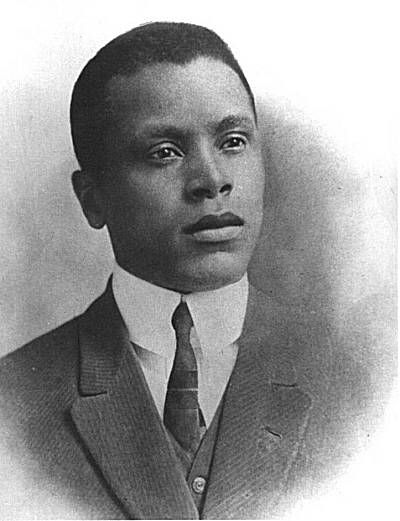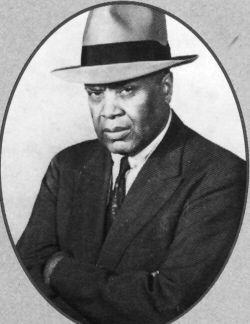Oscar Micheaux
- SilentCinemaSchool

- Jun 26, 2020
- 5 min read
Updated: Oct 5, 2021
There’s always talk among Hollywood historians about the “great (white) men” who started it all…but what’s interesting is how many great people (black men, white women, Asians, etc.) are overlooked. While we aim to present you with the usual “who’s who” of the silent film industry, we also aim to give equal credit to those who have been given little (or no) credit at all! And today’s filmmaker is truly credit-worthy…

1884-1951
Oscar Micheaux. The first major African-American filmmaker, also known as the most successful African-American filmmaker in the first half of the 20th century. < The first half of the 20th century: AKA the “Classical Hollywood” period. He made 44 films, both silent and “talkie” in later years. Oscar was a man with a mission – to make films primarily for the black audience. But... how did he get to that point?
Oscar was born in Illinois and grew up in Kansas, the 5th of 13 children. His father had been born a slave, and eventually after being liberated, became a farmer. After trying to adjust to city life in order to give their children a better education, the Micheauxs decided to return to their farm. The city is no place for a large family used to the wide open spaces of the country! Well, teenage Oscar wasn’t too happy with the farm life and like most young men, went through a rebellious phase. His father, however, was having none of it. As far as Dad was concerned, Oscar could take his ‘tude back to the city to live with his older brother! So off he went.
After many attempts to work for someone else, Oscar decided to become his own boss. Wise move! He had a shoeshine stand, which helped him learn about business. Then he was a railroad porter, where he traveled the country with steady income and met many new people from different walks of life (including several kind, wealthy white people who would help with his future endeavors). He also expanded his business knowledge through this job, and saved up several thousand dollars by the time he left his position. He moved on to homesteading in (basically all-white) South Dakota with no prior experience – but that’s part of the challenge! During this time, he wrote several articles for submission to newspapers – one of which The Chicago Tribune published.
It was in South Dakota that he married a woman named Orlean. But after a while, Orlean felt she was being neglected by Oscar, as he was frequently tied up with his work. After giving birth while he was away on business, she completely drained their bank account, took the baby and was never seen again. Her father sold Oscar’s land and kept the money, and Oscar - although he tried to recover what was rightfully his – never succeeded in getting a dime back. Better days are ahead, Oscar!

Oscar's first book, written anonymously
With homesteading now in the past, Oscar decided to focus on writing. He sold his novels himself door-to-door, including one based on his life (The Conquest: The Story of a Negro Pioneer). In this book, his theme was people of color being successful in ways they never thought possible. He felt that the black population at the time could realize their potential and accomplish great things. In the book, Oscar discusses the difference between those who work hard and achieve success versus those who would rather claim hopelessness and remain victims without trying to succeed. He hoped that more people of color would migrate West and make a good life for themselves through homesteading, instead of staying impoverished in the cities of the East. One of Oscar’s fundamental beliefs was that hard work and enterprise would make any person rise to respect and prominence – regardless of their race. Spoiler alert: one of his later novels, The Case of Mrs. Wingate, became a National Bestseller!

An ad for Oscar's first film, The Homesteader (1919)
As with countless others, writing eventually turned to filmmaking for Oscar. In 1918, his novel (he’d rewritten ‘The Conquest’ and titled it ‘The Homesteader’) caught the attention of a small Los Angeles film company, the first one owned and operated by people of color. However, the company did not want Oscar involved as much as he wanted to be, and the deal fell through. So, being no stranger to the world of self-employed, Oscar formed his own company in Chicago: The Micheaux Film & Book Company. He contacted his wealthy friends from his railroad days to sell stock in his new company. Their first film – what else? The Homesteader, based on his book, starring a relatively new actress with lots of talent: Evelyn Preer! The film – and Oscar – drew praise from critics, and helped him establish a good reputation in filmmaking both in the US and internationally. Of course, some members of the Chicago clergy allegedly criticized the film – because what’s the fun in being religious if you can’t be mean about it?? 😛
Several more race films followed for Oscar’s company, gaining more momentum with the public. One of his best-known films is Within Our Gates! He wrote, produced and directed his films, as creative geniuses are prone to do. He had things to say about race – and the public wanted to hear it. Tell it like it is, Oscar! His films were considered controversial (!) for their time, and frequently disrupted State censors due to their unapologetic depictions of people of color as just that – PEOPLE! More on early Hollywood censorship to come! Many of his films dealt with “hot topics” such as biracial passing, interracial relationships, racial injustice, etc. Oscar once said,
“It is only by presenting those portions of the race portrayed in my pictures, in the light and background of their true state, that we can raise our people to greater heights”
Excellent words from an excellent man! He became the first African-American to produce a film that was shown in a “white” theater, too – talk about forward motion for equality!

A later portrait of the great man (year unknown)
When the Great Depression hit, it was felt strongly in the filmmaking world, and many people found themselves unable to get funding for their projects. Oscar was one of them. For a time, he returned to writing, putting filmmaking on hold. But eventually, as the cinema world picked up speed, he returned – and began making sound films! He would continue making sound films until 1948. In 1951, Oscar passed away due to heart failure. He was survived by his second wife Alice B. Russell, and was laid to rest in his childhood hometown of Great Bend, Kansas with his family members – where his headstone reads, “A man ahead of his time”. We wholeheartedly agree.
References:


.png)



Comments